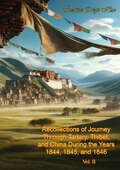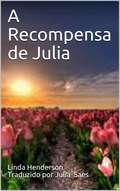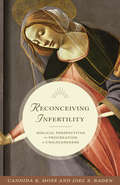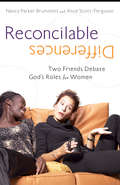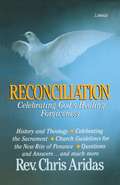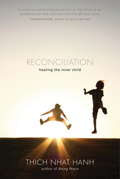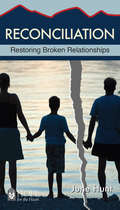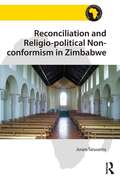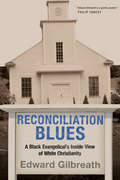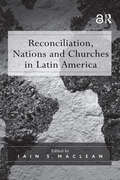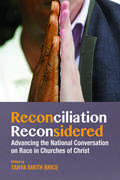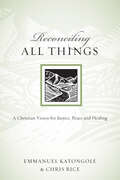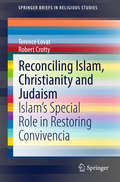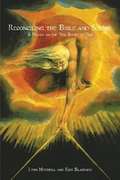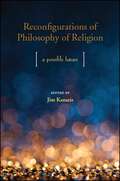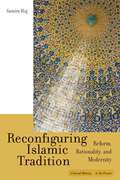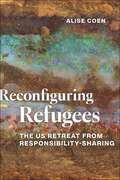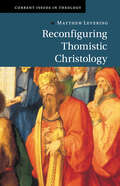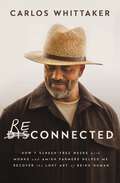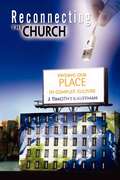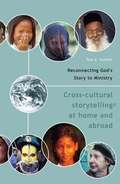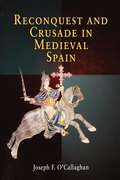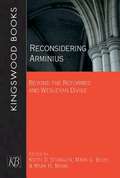- Table View
- List View
Recollections of Journey Through Tartary, Thibet, and China During the Years 1844, 1845, and 1846 Vol. II (Recollections of Journey Through Tartary, Thibet, and China During the Years 1844, 1845, and 1846 #2)
by Évariste Régis Huc"Recollections of Journey Through Tartary, Thibet, and China During the Years 1844, 1845, and 1846" by Evariste Huc is an enthralling travel memoir that chronicles the author's remarkable expedition across some of the most remote and fascinating regions of Asia. Evariste Huc, a French missionary, provides an extraordinary firsthand account of his adventures and observations as he traversed the vast landscapes of Tartary (Central Asia), Tibet, and China during the mid-19th century.Huc's narrative is rich with vivid descriptions of the diverse cultures, peoples, and landscapes he encountered on his journey. From the vast steppes of Tartary to the majestic heights of the Tibetan plateau, and the intricate social fabric of imperial China, Huc's keen eye for detail and deep curiosity bring these distant lands to life. His encounters with nomadic tribes, Buddhist monks, and Chinese officials offer readers a rare glimpse into the lives and customs of these regions during a time of limited Western influence."Recollections of Journey Through Tartary, Thibet, and China" is more than just a travelogue; it is a valuable historical document that captures a pivotal moment in the cultural and political landscapes of Asia. Huc's reflections on the religious practices, political structures, and daily life of the people he met provide a comprehensive and nuanced understanding of these regions.Evariste Huc's eloquent and engaging writing style, combined with his perceptive insights and adventurous spirit, makes this book a timeless classic in the genre of travel literature. It is an essential read for historians, geographers, and anyone with an interest in the rich tapestry of Asian cultures and the history of exploration. Through Huc's eyes, readers are transported to a bygone era, experiencing the wonders and challenges of a journey through some of the most remote and mystical parts of the world.
Recommended for You
by Laura SilvermanShoshanna Greenberg loves working at Once Upon, her favorite local bookstore. And with her moms fighting at home and her beloved car teetering on the brink of death, the store has become a welcome escape. When her boss announces a holiday bonus to the person who sells the most books, Shoshanna sees an opportunity to at least fix her car, if none of her other problems. The only person standing in her way? New hire Jake Kaplan. Jake is an affront to everything Shoshanna stands for. He doesn&’t even read! But somehow his sales start to rival hers. Jake may be cute (really cute), and he may be an eligible Jewish single (hard to find south of Atlanta), but he&’s also the enemy, and Shoshanna is ready to take him down. But as the competition intensifies, Jake and Shoshanna grow closer and realize they might be more on the same page than either expects…
A Recompensa de Julia
by Linda HendersonJulia está ansiosa para competir e vencer o concurso de soletração. No entanto, ela aprende que existem recompensas que podem trazer a ela ainda mais alegria e satisfação. Crianças de 6 a 8 anos podem, realmente, se beneficiar da experiência de Julia.
Reconceiving Infertility
by Candida R. Moss Joel S. BadenIn the Book of Genesis, the first words God speaks to humanity are "Be fruitful and multiply." From ancient times to today, these words have been understood as a divine command to procreate. Fertility is viewed as a sign of blessedness and moral uprightness, while infertility is associated with sin and moral failing. Reconceiving Infertility explores traditional interpretations such as these, providing a more complete picture of how procreation and childlessness are depicted in the Bible.Closely examining texts and themes from both the Hebrew Bible and the New Testament, Candida Moss and Joel Baden offer vital new perspectives on infertility and the social experiences of the infertile in the biblical tradition. They begin with perhaps the most famous stories of infertility in the Bible--those of the matriarchs Sarah, Rebekah, and Rachel--and show how the divine injunction in Genesis is both a blessing and a curse. Moss and Baden go on to discuss the metaphorical treatments of Israel as a "barren mother," the conception of Jesus, Paul's writings on family and reproduction, and more. They reveal how biblical views on procreation and infertility, and the ancient contexts from which they emerged, were more diverse than we think.Reconceiving Infertility demonstrates that the Bible speaks in many voices about infertility, and lays a biblical foundation for a more supportive religious environment for those suffering from infertility today.
Reconcilable Differences
by Nancy Parker Brummett Alice Scott-FergusonAlice: "Men and women are completely of equal value. Their biological differences do not detract from that equal status." Nancy: "Men and women are equally valued by God, but are assigned different roles." Who do you agree with? Finally, an open discussion of women's roles between two strong, intelligent Christian women. In a fun and unique way, Reconcilable Differences presents honest answers to the perplexing questions all women ask, such as, "What does submission mean?" "What's a woman's role inside the church?" and "Can a Christian be a feminist?" By revealing to one another the fallacies in gender stereotypes, authors Nancy and Alice show that it is possible to live, love, and be at liberty to disagree without breaking the bond of unity in the body of our Lord Jesus Christ.
Reconciliation: Celebrating Gods Healing Forgiveness
by Chris AridasCelebrating God's healing forgiveness
Reconciliation
by Thich Nhat HanhBased on Dharma talks by Zen Master Thich Nhat Hanh and insights from participants in retreats for healing the inner child, this book is an exciting contribution to the growing trend of using Buddhist practices to encourage mental health and wellness. Reconciliation focuses on the theme of mindful awareness of our emotions and healing our relationships, as well as meditations and exercises to acknowledge and transform the hurt that many of us experienced as children. The book shows how anger, sadness, and fear can become joy and tranquility by learning to breathe with, explore, meditate, and speak about our strong emotions. Reconciliation offers specific practices designed to bring healing and release for people suffering from childhood trauma. The book is written for a wide audience and accessible to people of all backgrounds and spiritual traditions.
Reconciliation: Restoring Broken Relationships (Hope for the Heart)
by June HuntSarcasm. Hurt feelings. Misunderstanding. Alienation. When hurt people connect with other hurt people, relationship breakdowns are sure to occur. Why is it so hard to patch things up? Who should make the first move? This 96-page book on reconciliation tackles how to forgive the "un-forgivable," how to move past the hurt, and how to restore relationships by restoring trust. What is Reconciliation? 3 Core Truths about Broken Relationships and Reconciliation• Forgiving someone is not the same as reconciliation. • Unforgiveness is the root of unresolved conflict. • Reconciliation is a restored relationship based on restored trust. Even when there are valid reasons to feel hurt and even when the other person is undeserving, the spirit of reconciliation reflects the heart of God. Find out what you need to know about reconciliation and healing in relationships. It includes—•Definition Section on Reconciliation, Restoration, and MediationDiscover the real truth that with God there is no relationship that cannot be restored. Review key definitions and encouraging Bible stories that show God's heart and desire for reconciliation and forgiveness. Covers key Bible stories, such as David, Joseph and his brothers, Abigail, and Jesus. "Even though God has set the standard for forgiveness and reconciliation, the reality of conflicts and personal offenses raises questions—questions Ms. Hunt addresses. Is there a difference between forgiveness and reconciliation? Must forgiveness result in reconciliation? The story of Joseph’s reconciliation with the brothers who had abused him and sold him as a slave is one of several stories the author recounts to illustrate the grace and mercy required to restore severed relationships."—Dave Barkey, Retired Pastor, Colorado,Team Rose Representative
The Reconciliation (The Amish of Southern Maryland #3)
by Susan Lantz SimpsonWinter in Southern Maryland’s Amish country brings brisk winds, crisp snow, and evenings spent nestled by a warm fireside. For one prodigal daughter, it may also bring a new beginning . . . On her baptismal day, Rebecca Zook ran from the church, leaving her stunned Amish community behind. She only wanted to see something of Gott’s vast world, but city life didn’t turn out as planned. Tricked into a sham marriage, Becky has come home humbled, wiser . . . and pregnant. Her mamm and daed are welcoming, and helping an overburdened young widow gives Becky a new sense of purpose. But after creating such scandal, Becky feels unworthy of a loving husband—let alone a wunderbaar man like Atlee Stauffer. Atlee knows Becky’s situation—and understands why his mother advises him to be careful. Still, this once flighty, flirty girl has become a thoughtful, kind young woman. He’s drawn to Becky like a magnet to a nail. One day, he hopes to build a family with her. But first, he must convince her wary, troubled heart to accept forgiveness and love . . .
Reconciliation and Religio-political Non-conformism in Zimbabwe (Religion in Modern Africa)
by Joram TarusariraReligio-political organisations in Zimbabwe play an important role in advocating democratisation and reconciliation, against acquiescent, silenced or co-opted mainstream churches. Reconciliation and Religio-political Non-conformism in Zimbabwe analyses activities of religious organisations that deviate from the position of mainline churches and the political elites with regard to religious participation in political matters, against a background of political conflict and violence. Drawing on detailed case studies of the Zimbabwe Christian Alliance (ZCA), Churches in Manicaland (CiM) and Grace to Heal (GtH), this book provocatively argues that in the face of an unsatisfactory religious and political culture, religio-political non-conformists emerge seeking to introduce a new ethos even in the face of negative sanctions from dominant religious and political systems.
Reconciliation Blues: A Black Evangelical's Inside View of White Christianity
by Edward GilbreathWhat is the state of racial reconciliation in evangelical churches today? Are we truly united? In Reconciliation Blues journalist Edward Gilbreath gives an insightful, honest picture of both the history and the present state of racial reconciliation in evangelical churches. In his thoughtful overview he looks at a wide range of figures, such as Howard O. Jones, Tom Skinner, Dr. Martin Luther King Jr., Jesse Jackson and John Perkins. Charting progress as well as setbacks, his words offer encouragement for black evangelicals feeling alone, clarity for white evangelicals who want to understand more deeply, and fresh vision for all who want to move forward toward Christ's prayer "that all of them may be one." Now in paper!
Reconciliation, Nations and Churches in Latin America
by Iain S. MacleanThis book examines the recent phenomenon in Latin America of national Truth and Reconciliation commissions. Few studies have examined the role of Churches or religion in political processes that proclaim valued theological terms as their agenda - truth, forgiveness, and reconciliation. This book questions the role of religion, specifically of established Churches. The impact of such reconciliation commissions on Indigenous Native Americans is also examined, as is the role of women and how both commissions and Churches or religions were challenged by their experiences. The contributors offer differing perspectives on one or more national truth and reconciliation processes and thus offer a collection that serves as valuable source for the disciplines of Religious Studies, Ethics, Theology, Political Science, Social Sciences and Women's Studies.
Reconciliation Reconsidered: Advancing the National Conversation on Race in Churches of Christ
by Tanya Smith BriceReconciliation Takes Time.A broad racial divide mars Churches of Christ, and courageous leaders from across the United States have joined together to listen to one another. Rather than adopt a posture of resignation, they have met for honest, God-honoring conversation.In Reconciliation Reconsidered, Tanya Brice pulls together the early fruit she has gleaned from this ongoing conversation about racial reconciliation. Learn about yourself in the context of community as you explore these key ideas:•Exercise truth-telling: it's what is needed before any reconciliation can happen•Discover how race relations are not as simple as you think•Challenge your stereotypes•Understand the meaning of current events like the Ferguson shooting in fresh ways•Revisit Christ's teachings with a careful eye toward discipleship and love of your neighbor•Each chapter concludes with discussion questions that can help you and others navigate this perplexing and difficult topic.
Reconciling All Things: A Christian Vision for Justice, Peace and Healing (Resources for Reconciliation)
by Chris Rice Emmanuel KatongoleChristianity TodayOur world is broken and cries out for reconciliation.But mere conflict resolution and peacemaking are not enough. What makes real reconciliation possible? How is it that some people are able to forgive the most horrendous of evils? And what role does God play in these stories? Does reconciliation make any sense apart from the biblical story of redemption?Reconciling All ThingsThis powerful, concise book lays the philosophical foundations for reconciliation and explores what it means to pursue hope in areas of brokenness in theory and practice.
Reconciling Islam, Christianity and Judaism
by Terence Lovat Robert CrottyAt the present time, when so-called Islamic radicalism, terrorism and Jihadism occupy major media space, with Islam often depicted as the main culprit, the book attempts a tour de force. It proposes that Islam is as much victim as culprit in the history that has led to the current hostility. This is because the common claims of both mainstream and radical Islam that Islam represents the high point of the Abrahamic tradition, and therefore a purification of Judaism and Christianity, have been largely ignored, misunderstood or blatantly rejected by these faiths and therefore by 'the West' in general. This rejection has effectively rendered Islam as the poor cousin, if not the illegitimate sibling, of the tradition. In turn, this has created long-term resentment and hostility within Islam as well as robbed the 'Judaeo-Christian West' of a rich, inter-faith understanding of the wider Abrahamic tradition. The book explores these claims through textual, historical and theological analyses, proposing that many of them stand up better to critical scrutiny than has been commonly acknowledged. It further proposes that seeing Islam in this way has potential to re-awaken its self-understanding as a leader of accord among the Abrahamic faiths, of the kind that characterized the era of Convivencia when, in medieval Spain, Islam constructed and contributed to advanced civilizations characterized by relatively harmonious co-existence between Muslims, Christians and Jews. The book focuses on the role that a more respected and self-confident Islam could play in forging enhanced inter-faith relations in a world that desperately needs them as it struggles to understand and deal with modern and particularly vicious forms of radical Islamism.
Reconciling the Bible and Science: A Primer on the Two Books of God
by Kirk Blackard Lynn MitchellReconciling the Bible and Science acknowledges the Bible as the word of God, demonstrates why there is no conflict between the Bible and science, and shows readers how to accept both.
Reconfigurations of Philosophy of Religion: A Possible Future
by Jim KanarisThis collection addresses, as it exemplifies, an identity crisis in contemporary philosophy of religion. It represents a unique two-way dialogue between philosophers of religion and scholars of religion and broaches issues pertaining to the philosophy of religion and the philosophical tradition, on the one hand, and religious studies, theology, and the modern academy on the other. While each author manages the current challenges in philosophy of religion differently, one can nonetheless discern a polyphony of interests surrounding a postcritical, postsecular appreciation of religion. In part 1, contributors ask how philosophy of religion can accommodate both the strengths and weaknesses of Western analytic and continental traditions; incorporate developments in ideology critique, gender studies, and Asian philosophies; and negotiate the perceived stalemate in philosophy of religion. Part 2 addresses these questions in terms of a philosophy of religion that is postcolonial in intention and multidisciplinary in orientation and features scholarship from the fields of both religion and theology. An underlying theme is the importance of ushering philosophy of religion into a postphenomenological era of religious studies and theology. This is a neglected dimension in many laudable discussions about philosophy of religion that this volume hopes to emend.
Reconfiguring Islamic Tradition
by Samira HajHaj (history, City U. of New York-Graduate Center) analyzes the work of two significant Muslim reformers that many consider to have inspired the two major strands of contemporary Islamic political thought. One is Muhammed ibn Abdul Wahhab (1703-87), whose work inspires groups like al-Qa'ida; the second is Egyptian reformer Muhammad 'Abduh (1849-1905). Western scholarship labels the first fundamentalist and traditional, and the second liberal and modern, but he looks at both of their ideas in terms of their own political goals, not that of Western powers. Annotation ©2009 Book News, Inc. , Portland, OR (booknews. com)
Reconfiguring Refugees: The US Retreat from Responsibility-Sharing
by Alise CoenShows how domestic identity narratives and political polarization shape the sociopolitical response to refugeesThe United States once played a major role in global refugee resettlement, accounting for nearly two-thirds of all refugees resettled worldwide. However, in recent years, it has dramatically cut refugee admissions and implemented discriminatory policies on refugee protection. These policies have been justified amid intensifying xenophobic rhetoric against specific groups.In this book, Alise Coen explains why the monumental shift around refugee resettlement occurred, particularly in response to the high-profile conflict in Syria. She shows how refugees—and broader global migration debates—became contentious political issues in the US, revealing the many ways in which refugees have been increasingly weaponized as partisan symbols by Democrats and Republicans. The book calls attention to the power of rhetoric and identity narratives, and shows how the language used to talk about refugees fuels divisivepolicies.From the years leading up to the Trump administration’s policies targeting Muslim refugees to debates during the Biden administration around who deserves access to asylum, Coen examines how ideas about race, gender, and nativism shape US approaches toward migration. As arguments for “closing the border” continue to gain traction and politicians continue to use global displacement issues to further their agendas, Reconfiguring Refugees explores the ideas, meanings, and policies that undermine and influence US responsibility-sharing.
Reconfiguring Thomistic Christology (Current Issues in Theology)
by Matthew LeveringIn this book, Matthew Levering unites eschatologically charged biblical Christology with metaphysical and dogmatic Thomistic Christology, by highlighting the typological Christologies shared by Scripture, the Church Fathers, and Aquinas. Like the Church Fathers, Aquinas often reflected upon Jesus in typological terms (especially in his biblical commentaries), just as the New Testament does. Showing the connections between New Testament, Patristic, and Aquinas' own typological portraits of Jesus, Levering reveals how the eschatological Jesus of biblical scholarship can be integrated with Thomistic Christology. His study produces a fully contemporary Thomistic Christology that unites ressourcement and Thomistic modes of theological inquiry, thereby bridging two schools of contemporary theology that too often are imagined as rivals. Levering's book reflects and augments the current resurgence of Thomistic Christology as an ecumenical project of relevance to all Christians.
Reconnected: How 7 Screen-Free Weeks with Monks and Amish Farmers Helped Me Recover the Lost Art of Being Human
by Carlos WhittakerUSA TODAY BESTSELLERChange your relationship with technology. Change your life.Share. Post. Reply…Most of us have gotten so used to notifications and alerts, pings and rings, that even if we don't want to be on our phones so much, we don't know what to do about it. The constant flow of information affects our brains, relationships, and emotional well-being. We feel stuck, overwhelmed, overstimulated, and we want a way out.Like many of us, podcaster and author Carlos Whittaker had lived for years in an always-on, always-connected world—and he felt more disconnected than ever from God, his community, and even himself. When Carlos Whittaker realized how many hours he was on his phone, he took extreme measures to see how unplugging could change his body and soul.In Reconnected, Carlos shares the challenges, surprises, and profound insights of his self-imposed exile from technology, spending nearly two months screen-free at a monastery, an Amish farm, and at home. As you journey with Carlos through this life-changing experiment you will discover:how to retrain yourself to notice the world before you notice your texts;what technology does to your brain and what you can do about it;ways to prioritize in-person relationships even if you need screens for work or school;why turning down your phone's volume turns up God's voice in your life;the newfound joy of being bored, getting lost, and not having to Google every question that comes to your mind. Blending wisdom from the past, practices of intentionality and community, and Whittaker's signature engaging communication style, Reconnected will inspire and equip you to reset your life in a tech-saturated world. It's time to take back control of your life from technology and recover the lost art of being human. You were made for more. This is how you start living again.
Reconnecting The Church
by J. Timothy KauffmanReconnecting the Church is offered as a practical guide to assist pastors and laypeople in understanding the city, engaging, and serving the local community in which the church is located. The book’s purpose is to come along side the local church that wishes to reconnect to its local community, and offer practical ways to accomplish that task. There are 25 chapters each of which describes briefly an aspect of life in the city. At the end of each chapter are practical action/reflection projects. These projects are designed to give the reader first-hand experience of their church’s immediate neighborhood. They are specific tasks, most of which will be done outside the church. Each action is described, and guidance is given for reflection after each project.
Reconnecting God's Story to Ministry: Cross-Cultural Storytelling at Home and Abroad
by Tom A. SteffenThis book will introduce practical ways to increase many of the storytelling skills for evangelism-discipleship among those of like culture.
Reconquest and Crusade in Medieval Spain
by Joseph F. O'CallaghanDrawing from both Christian and Islamic sources, Reconquest and Crusade in Medieval Spain demonstrates that the clash of arms between Christians and Muslims in the Iberian peninsula that began in the early eighth century was transformed into a crusade by the papacy during the twelfth and thirteenth centuries. Successive popes accorded to Christian warriors willing to participate in the peninsular wars against Islam the same crusading benefits offered to those going to the Holy Land. Joseph F. O'Callaghan clearly demonstrates that any study of the history of the crusades must take a broader view of the Mediterranean to include medieval Spain.Following a chronological overview of crusading in the Iberian peninsula from the late eleventh to the middle of the thirteenth century, O'Callaghan proceeds to the study of warfare, military finance, and the liturgy of reconquest and crusading. He concludes his book with a consideration of the later stages of reconquest and crusade up to and including the fall of Granada in 1492, while noting that the spiritual benefits of crusading bulls were still offered to the Spanish until the Second Vatican Council of 1963.Although the conflict described in this book occurred more than eight hundred years ago, recent events remind the world that the intensity of belief, rhetoric, and action that gave birth to crusade, holy war, and jihad remains a powerful force in the twenty-first century.
Reconsidering Arminius: Beyond the Reformed and Wesleyan Divide
by Keith D. Stanglin Mark G. Bilby Mark H. MannThe theology of Dutch theologian Jacob Arminius has been misinterpreted and caricatured in both Reformed and Wesleyan circles. By revisiting Arminius's theology, the book hopes to be a constructive voice in the discourse between so-called Calvinists and Arminians. Traditionally, Arminius has been treated as a divisive figure in evangelical theology. Indeed, one might be able to describe classic evangelical theology up into the twentieth century in relation to his work: one was either an Arminian and accepted his theology or one was a Calvinist and rejected his theology. Although various other movements within evangelicalism have provided additional contour to the movement (fundamentalism, Pentecostalism, etc.), the Calvinist-Arminian 'divide' remains a significant one. What this book seeks to correct is the misinterpretation of Arminius as one whose theology provides a stark contrast to the Reformed tradition as a whole. Indeed, this book will demonstrate instead that Arminius is far more in line with Reformed orthodoxy than popularly believed and show that what emerges as Arminianism in the theology of the Remonstrants and Wesleyan movements was in fact not the theology of Arminius but a development of and sometimes departure from it. This book also brings Arminius into conversation with modern theology. To this end, it includes essays on the relationship between Arminius's theology and open theism and Neo-Reformed theology. In this way, this book fulfills the promise of the title by showing ways in which Arminius's theology--once properly understood--can serve as a resource of evangelical Wesleyans and Calvinists doing theology together today. Editors: Keith D. Stanglin, Mark G. Bilby, and Mark H. Mann Contributors: Jeremy Dupertuis Bangs Mark G. Bilby Oliver D. Crisp W. Stephen Gunter John Mark Hicks Mark H. Mann Thomas H. McCall Richard A. Muller Keith D. Stanglin E. Jerome Van Kuiken
